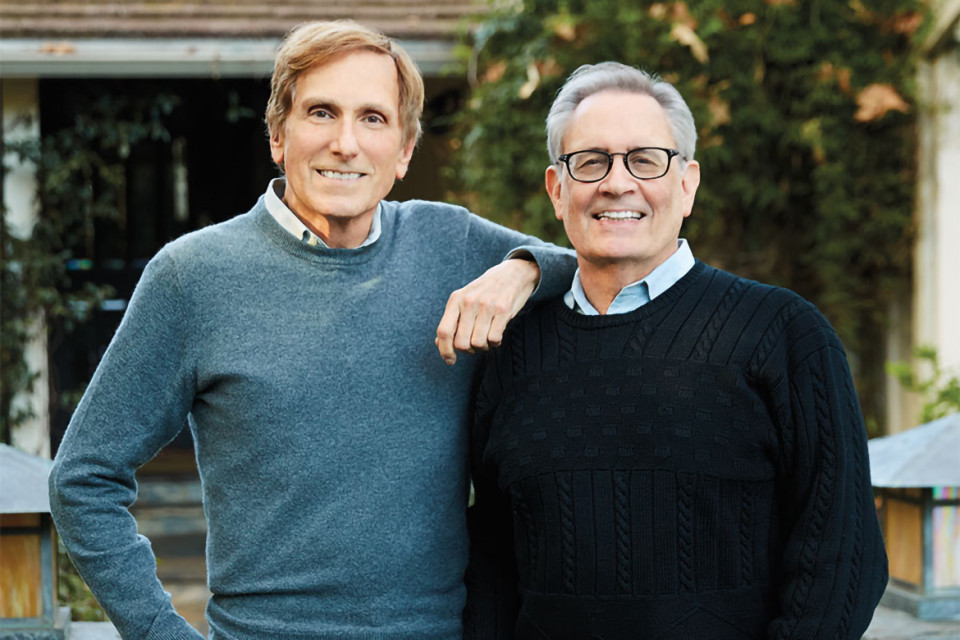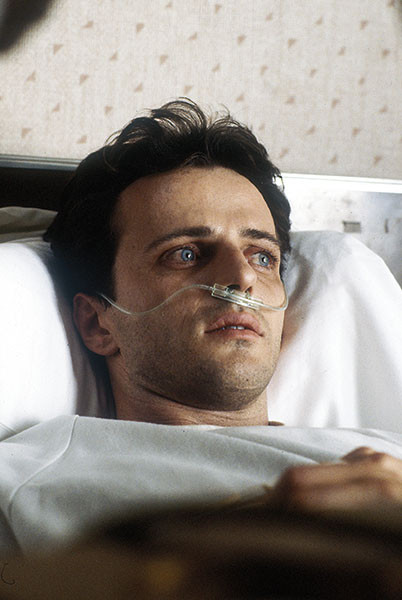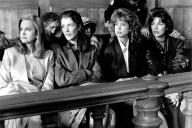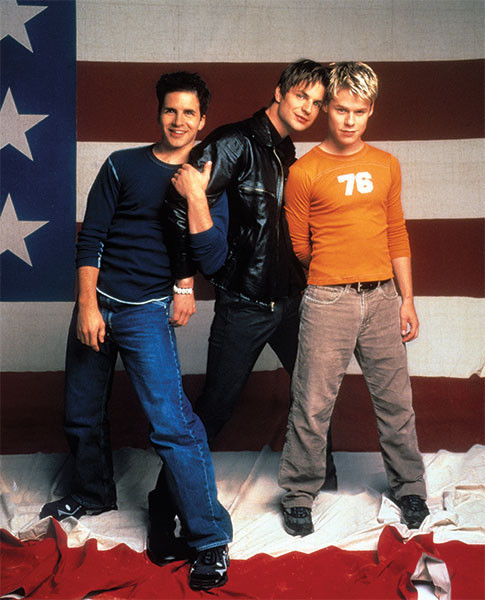On November 11, 1985, an unlikely NBC telefilm took the number-one spot in the Nielsens.
An Early Frost was seen by 34 million Americans and earned a 23.3 share — stats that are hard to fathom in today's fractured television world.
But the film had an impact beyond numbers — it was the first American TV movie to deal with the topic of AIDS. It subsequently captured 14 Emmy nominations and won four, including one for its writers, Ron Cowen and Daniel Lipman.
Fifteen years later, Cowen and Lipman marked another milestone, the debut of the American adaptation of Queer As Folk. The first U.S. hour-long TV drama to portray the lives of gay men and women, it ran for five seasons on Showtime.
Their collaboration dates to 1972. Cowen, who was born in Cincinnati, Ohio, and Lipman, who hails from Baltimore, Maryland, met at the O'Neill Playwrights Conference and agreed to partner up on an evening of one-act plays.
That decision led to a lifetime of teamwork in theater and television. They went on to win the Emmy in 1986 for outstanding writing in a miniseries or special for their teleplay of An Early Frost; they also associate-produced the film.
In addition to creating, executive-producing and writing the American version of Queer As Folk (it was based on a British series), they also served in those same roles for the NBC series Sisters.
Entertainment was always their writing objective, but they also sought to enlighten.
"One of the amazing things about television is, it's so powerful," Cowen says. "Seeing a reflection of yourself validates your life. Gay people had none of that. For them, for us, to see stories about us, about our lives… it meant you exist."
On the personal side, after 43 years together, the duo wed in 2015, when marriage equality was recognized. They continue to be active in the theater community, serving on the board of trustees of the O'Neill Theater Center in Connecticut.
Cowen and Lipman were interviewed by Nancy Harrington in July 2019 for a coproduction of the Writers Guild Foundation and The Interviews: An Oral History of Television, a program of the Television Academy Foundation. The following is an edited excerpt of their conversation.
The entire interview can be seen at TelevisionAcademy. com/Interviews.
Q: In 1983 you were approached to write the teleplay for An Early Frost ….
DL: Deborah Aal was at NBC Productions. And the call came.
RC: She called us and said NBC wants to do a TV movie about AIDS. It was [NBC executive] Perry Lafferty's idea. He was going to leave NBC and become a producer. Perry was a really lovely man.
DL: Old school.
RC: From another time. He was such a gentleman. Soft spoken. Not gay. But he knew this was an important subject. And we had made friends with Deborah on a pilot that didn't go anywhere and she thought of us. That's how we got the opportunity to write this really wonderful movie.
Q: Did you have any reservations about doing it?
DL: We had some conditions, believe it or not — these two young writers. It was a terrible time [with the AIDS epidemic] and if you weren't there, it's hard to make people realize how terrifying it was. It wasn't called AIDS — it was called GRID: gay-related immune deficiency. It was a death sentence then. It isn't now.
When we went in to talk about it with NBC, the first thing we said was, "This character we're creating cannot die at the end. There can't be a funeral."
At the end of the film, it's sort of metaphoric, he [Michael Pierson, played by Aidan Quinn] says goodbye to his parents, gets into a cab and drives off into the darkness. You don't know what happened to him. Hopefully he will be one of the lucky ones.
RC: A line in the movie was, "All they have is hope." They have nothing else. There was no medication. So we said, "We cannot show the main character in this movie dying at the end. It's too cruel. You have to leave someone their hope."
DL: And NBC said fine.
Q: How long did it take to write?
RC: A year and a half.
DL: We did 13 drafts. Perry said, "We're going to go to each person who has to sign off on this. Get their notes. You'll do their notes, and then they'll each sign off on it." We had to go to 10 or 11 people.
RC: We got to meet Standards & Practices, a fancy way of saying the censor. And some of the suggestions were very helpful. One was, you can't make the straight people the villains and the gay people the good guys. It has to have balance.
But there was nothing in that movie that we hadn't heard in our research — like nurses leaving trays outside the hospital doors because they wouldn't go in the room with the patients.
We had interviewed several men over at Santa Monica Hospital. The medical advisor on our film, Michael Roth, treated patients with AIDS, and took us there so we could interview them, basically on their deathbeds. It was tough. Everything that happened in that movie was based on something somebody told us.
DL: And to show you how primitive times were, NBC gave us a book that said that AIDS was carried by mosquitoes.
RC: A lot wasn't known yet. But NBC was so damn brave to do this show. Perry was such a visionary and so courageous to do this show at that time. Thirty-four million people saw it. Can you imagine? It beat Monday Night Football.
DL: With no sponsors.
RC: No one would sponsor the show. NBC lost a lot of money. There was one commercial in the entire show.
DL: It was all promos except for the one commercial — for the King James Bible.
RC: And the actors were amazingly brave to be doing this. Aidan Quinn, particularly.
DL: He sought it out.
RC: He had been volunteering for an AIDS charity. It was very important to him to be part of it. It meant a lot to everyone who worked on the film, because we all knew we were doing something historic.
It was the first major film about AIDS. It was the first time a large number of people in this country even learned any facts about AIDS.
DL: We discovered our writing voice on An Early Frost. We realized that every comedy scene should have some drama, and every dramatic scene should have some comedy. That's how we deal with things in life, with a lot of humor and jokes. It's the only way to get through life.
Q: What is the legacy of An Early Frost?
RC: We thought that it would open the door for more projects about this subject. At the time, it was so important for as many people as possible to see stories about it on TV. That did not happen.
Other people went in, tried to pitch stories. They said, "We don't need to do that story — Early Frost already did it." It closed doors as far as TV was concerned.
Q: Let's talk about Sisters.
DL: NBC said they needed a family drama and they asked us to develop Sisters. One of the executives there told us that he had grown up next to a family of four sisters — and they all had boys' names because the father really wanted boys. So we developed the series about Alex, Teddy, Frankie and Georgie.
Sisters wasn't a cop show, a law show, a medical show or a procedural; it was a show about women's lives and social issues, political issues, medical issues, family issues… all the issues that women were dealing with.
The network referred to women as a niche audience. And we said, "Really? That's interesting, because there are more women on earth than men." And our show got huge ratings with women. It was a demographic hit, always in the top 10. And we had great sponsors. So we survived. And we had a great cast.
RC: Wonderful. Swoosie Kurtz and Sela Ward, Patricia Kalember and Julianne Phillips… We had George Clooney, Ashley Judd and Paul Rudd, giving them their first shots.
Q: Is it true that you wanted to make one of the characters gay?
RC: Yes. We had a couple of issues with NBC over this. Frankie, the youngest sister, at that time she wasn't married. She was a lawyer, and it seemed like there was something missing in her as a person — that she didn't know something about herself.
And we floated the idea in a meeting, that perhaps she was gay and had not come to terms with her sexuality.
DL: Which excited us, because there would be story opportunities and a lot of conflict in the family.
RC: And the network said absolutely not. No way.
DL: What they said was: "That's a great idea. Go find another network to put the show on the air."
Q: You were also executive producers and showrunners….
RC: Yes, and one of the important aspects of being a showrunner is to have an open door to everyone. And to respect people who know more than you. We are not directors. Kevin [Inch] is a TV director. So we listened to Kevin when he said, "I think this would be a good choice for us."
We had certain input. We said, "We want to find as many women directors as we can; it's a show about women." That was at a time when there weren't many women directors. Our writing staff was primarily women.
You're writing a show about women. Why wouldn't you hire women to write and direct it? That's what we did. And unlike An Early Frost, it opened the door for a lot of other shows — for women's dramas, with women stars.
DL: I don't think there would have been Desperate Housewives without Sisters.
RC: Providence. Ally McBeal. There were a lot of shows after Sisters that were about women's lives. I think they discovered that women are not a niche audience.
DL: Women run the world, or they should.
Q: Let's move on to Queer As Folk. You developed and executive-produced the U.S. version of the show for Showtime in 2000.
DL: After Sisters, we developed a show called Leap Years for Showtime that lost its financing. We were devastated by this and said, "Let's go on a vacation." So we went to France and Italy for two weeks.
We came back and on that Sunday, in the L.A. Times, there was a cover story, "The Best Show You Will Never See." It was all about Queer As Folk, the British version.
We read this article and went to lunch with our agent, and at a table near us was Jerry Offsay, who was president of Showtime at the time. He came by the table.
RC: And we said, "We saw this article. Would you consider us for that project?" It was one of those instances of being in the right place at the right time.
Q: Had you seen the British version?
RC: Not at all.
DL: But they [subsequently] sent us the video.
RC: We watched it, and we were shocked. We couldn't believe it.
Q: Did you have any reservations when you saw it?
DL: Not really. When we write, we're very brave. We do not pull back. This was a rare window of opportunity. I remember saying to Ron, "This will never come around again."
RC: Like An Early Frost.
DL: We thought, "This is our opportunity to do this. We have to be as bold as we possibly can. Have courage and do it." And it was exciting to do.
Q: And was there censorship?
RC: None.
DL: Showtime's motto was "No Limits." They left us alone.
RC: And boy, did we test it.
DL: We had a wonderful executive named Pancho Mansfield, who was completely supportive, protected us, went to bat for us. You had to have that — you could not be tethered. It would have been a disaster.
Q: What was the TV landscape like at that time?
DL: All of our lead characters, except for the Sharon Gless character, were gay. And at the time, gay characters were represented as either eunuchs or clowns. They were sexless. They worked in an office; they were the gay nephew.
RC: They were to be laughed at.
DL: This was an opportunity to have characters who had a sexual life. Our youngest character, Justin, who takes us into this world, has no thought of suicide or angst. It was about the joy of being gay, celebrating it. That was the main thrust.
Gay people had been portrayed as people who wanted to kill themselves, jump in the ocean, hang themselves. This was not what the show was about.
RC: To talk about Queer As Folk, same as with An Early Frost, it's very important to put it into its time period.
[In 1996] Bill Clinton had signed the Defense of Marriage Act, a federal law stating that marriage was between a man and a woman.
[In 2003] President [George] Bush made a speech in the Rose Garden saying that he wanted to have the Constitution of the United States changed to say that marriage is between a man and a woman.
This was the world at the time we were writing Queer As Folk. It was not a gay-friendly world. It isn't particularly now, either, although you can get married. So we had a lot to write about.
If people want to know what it was like for gay people living in an urban setting at the turn of the 21st century in America, Queer As Folk will be a document of record.
Q: Talk about casting the show….
DL: Casting the show was impossible, unlike Sisters. I think one actor came in from William Morris, but no other agency sent anyone in for the show — actors or writers. They wouldn't touch our show. Our own agency sent one actor. I'd like to make that very clear and be on record for that. It was an untouchable show.
RC: The right people came to us, despite the difficulties.
DL: To do this show, you had to have a real commitment to the material, to gay people, to what it was saying.
Q: Who was the intended audience and who was the actual audience?
RC: It was intended to be a niche show for the gay community. It didn't quite turn out that way. Straight women loved our show. We didn't understand that at the beginning. But they turned out to be the majority of our audience.
I think it's what [actor] Peter Paige said: "They came for the Queer and stayed for the Folk." I thought that was the truest, cleverest way to express what happened.
They liked the humor, the heart and the heat — the three h's we associated with writing that show. And of course, there are a lot of nice-looking guys on the show, which didn't hurt.
I remember going to the men's room once, down the hall from our office, and this man starts talking to me while we're standing there peeing, saying, "My wife loves your show." I said, "Oh, that's nice. Thank you."
He said, "She got me watching it. I was really uncomfortable watching that stuff that you had those guys doing…." I'm rolling my eyes, thinking, Okay, here it comes…. He said, "But after a while, I really started to love your show. And I also got lucky."
His wife was turned on. He said, "I really loved your show after a while. The sex thing, after a while, didn't matter."
DL: It was no big deal.
RC: No big deal. Those are the three words we were living for. That's why we pushed the sex. And we knew what we were doing. We said, "We're just going to show it over and over again, until people get so numb and bored from it, that they're not going to care anymore."
That guy in the bathroom was the living proof of that.
One of the amazing things about television is, it's so powerful. Seeing a reflection of yourself validates your life.
Gay people had none of that. For them, for us, to see stories about us, about our lives… it meant you exist. It was very meaningful to see people seeing themselves in a way they never had before. Not as a joke. They were really affected. And we were, too.
DL: That's why it was pioneering. Because no one had ever done a show like this.
RC: I may be speaking for Dan, too, but I grew up, my entire life, watching TV, watching movies, watching straight people rolling around in bed. I never saw gay people in a situation like that. That part of one's life is very important.
You can't just sever that part of your life and say it doesn't exist. It does exist. And to never see yourself the way you would see straight people, until I was 45, 50 years old? I said, "This is our one opportunity and we're going to show it. We're going to make up for all those years." And we did.
Q: What was the difference between what you could show in An Early Frost versus Queer As Folk?
RC: Nothing and everything.
DL: We didn't write sex scenes for An Early Frost.
RC: They weren't allowed to kiss. They weren't allowed to touch. And there was a lot of flak about that from some viewers, that they don't look like lovers. And you want to say to them, "It's 1985. It's NBC. You're damn lucky it's even on the air. If you're expecting to see gay sex on NBC in 1985, what are you thinking?"
DL: Then, with Queer As Folk — everything exploded. We could show anything, everything, and we did.
Q: What is the legacy of Queer As Folk?
DL: I said it then, and I'll say it now: I don't think there will ever be another Queer As Folk. Even if there is another Queer As Folk, it'll never have the impact that this had.
We were very aware that we had this one window in time. And we're very grateful that we were able to do this, because we knew a lot of people wouldn't have gone to the lengths that we did. And it is part of gay and television history. I'm very proud of it.
RC: We've been very blessed in our career.
DL: And one of the highlights is being able to share it together.
RC: [To Lipman] Without you, it wouldn't have meant very much.
DL: I feel the same way.
This article originally appeared in emmy magazine, Issue No. 2, 2020


















